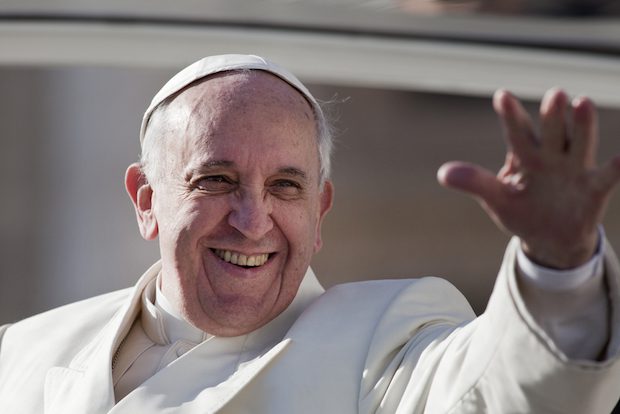Pope Francis, Chaplain To Liquid Modernity

Writing in the latest edition of the Italian Catholic magazine Il Timone, Messori took as a point of reference the Polish Jewish sociologist Zygmut Bauman who first introduced the idea of “liquid modernity.”
Bauman observed that the general trait of individualistic modern man is to flow through his own life like a tourist, changing places, jobs, spouses, values and even sexual orientation and gender. Bauman said the modern tendency is to exclude oneself from traditional networks of support, while at the same time freeing oneself from the restrictions or requirements those networks impose.
This trend towards such unbridled individualism has created societies in which “everything is unstable and changeable,” Messori noted, and referred to the “rapid change” not only in sexual behaviour but also in politics where legislators have given up on long term governance.
Quoting Bauman, he said it is becoming acceptable that “change” is the “only permanent thing” and that “uncertainty” has become the “only certainty.”
But he said this attitude has also afflicted the area of religion and the believer is now “disturbed by the fact that even the Catholic Church — which was an age-old example of stability — seems to want to become ‘liquid’ as well.”
Read the whole thing. As readers of The Benedict Option know, “liquid modernity” is a key concept I draw on for my analysis and prescription. In light of Messori’s commentary, I suppose it makes more sense that the Jesuit Father Antonio Spadaro, a top adviser to Pope Francis, condemned the Benedict Option as incompatible with Francis’s vision.
Along these lines, R.R. Reno, editor of First Things, has some very blunt things to say about the Catholic Church (he’s a Catholic) and its accommodation to liquid modernity. It’s the second item on the list. Excerpt:
This papacy is not hard to figure out. Pope Francis and his associates echo the pieties and self-complimenting utopianism of progressives. That’s not surprising. The Jesuit charism is multifaceted and powerful. I count myself among those profoundly influenced by the spiritual genius of St. Ignatius. Yet there’s no disputing that for centuries Jesuits have shown great talent in adjusting the gospel to suit the powerful. And so, I think the European establishment can count on the Vatican to denounce the populism currently threatening its hold on power. I predict that this papacy will be a great defender of migrants and refugees—until political pressures on the European ruling class become so great that it shifts and becomes more “realistic,” at which point the Vatican will shift as well. What is presently denounced will be permitted; what is presently permitted will be denounced.
Adjustment, trimming of sails, and accommodation are inevitable. The Catholic Church is not set up to be countercultural. Catholicism, at least in the West, has establishment in its DNA. But this papacy is uniquely invertebrate. I can identify no consistent theological structure other than a vague Rahnerianism and post–Vatican II sign-of-the-times temporizing. This makes Francis a purely political pope, or at least very nearly so. No doubt he has an evangelical heart. But ever the Jesuit, he seems to regard every aspect of the Church’s tradition as a plastic instrument to be stiffened here or relaxed there in accord with ever-changing pastoral judgments.
This will not end well. The West has seen a long season of loosening, opening up, and deconsolidation, of which the sexual revolution is but a part. Our establishment is committed to sustaining this consensus. This is why it has been at war with Catholic intransigence, which is based on the Church’s insistence that she answer to timeless, unchanging, and demanding truths. It’s foolish for the papacy to make a peace treaty with this establishment consensus. It’s theologically unworkable. It’s also politically inept. For the establishment consensus is failing, and that includes the sexual revolution, which made many promises that were not fulfilled.
I remember entering the Catholic Church in 1993, thinking that yes, it had its problems, but it was a solid rock on which to stand. It’s only after I came into Catholicism that I fully realized that whatever the Church was on paper, in actuality, all the struggles of liquid modernity were also taking place within the Church. There is no escaping them. But when my local parishes and pastors were squishy and compromising, at least I could look to Rome and the papacy to hold the line. You can’t do that anymore. And that is a nearly catastrophic loss.
Still, it is helpful for any convert to any form of Christianity to know that there is no truly safe harbor. There are safer harbors — Roman Catholicism is one of them, I’d say — but no place is truly safe. I’ll be writing later today about my own branch of the Christian faith, Orthodoxy, and what some new Pew Research says about its condition today. I’d say that Orthodoxy is the safest of all the safer harbors, but again, if anyone outside the faith thinks they are going to escape the deluge by taking refuge in the Orthodox Church, or any Church, they’re deceiving themselves. The best you can do is to embrace a form of Christianity that is deeply rooted in the past, and is more likely to resist the currents of popular opinion. Regrettably, this papacy seems to be working hard to dissolve the steadfast resistance that Rome gave in principle (if not always in reality, at the local level) to liquid modernity.